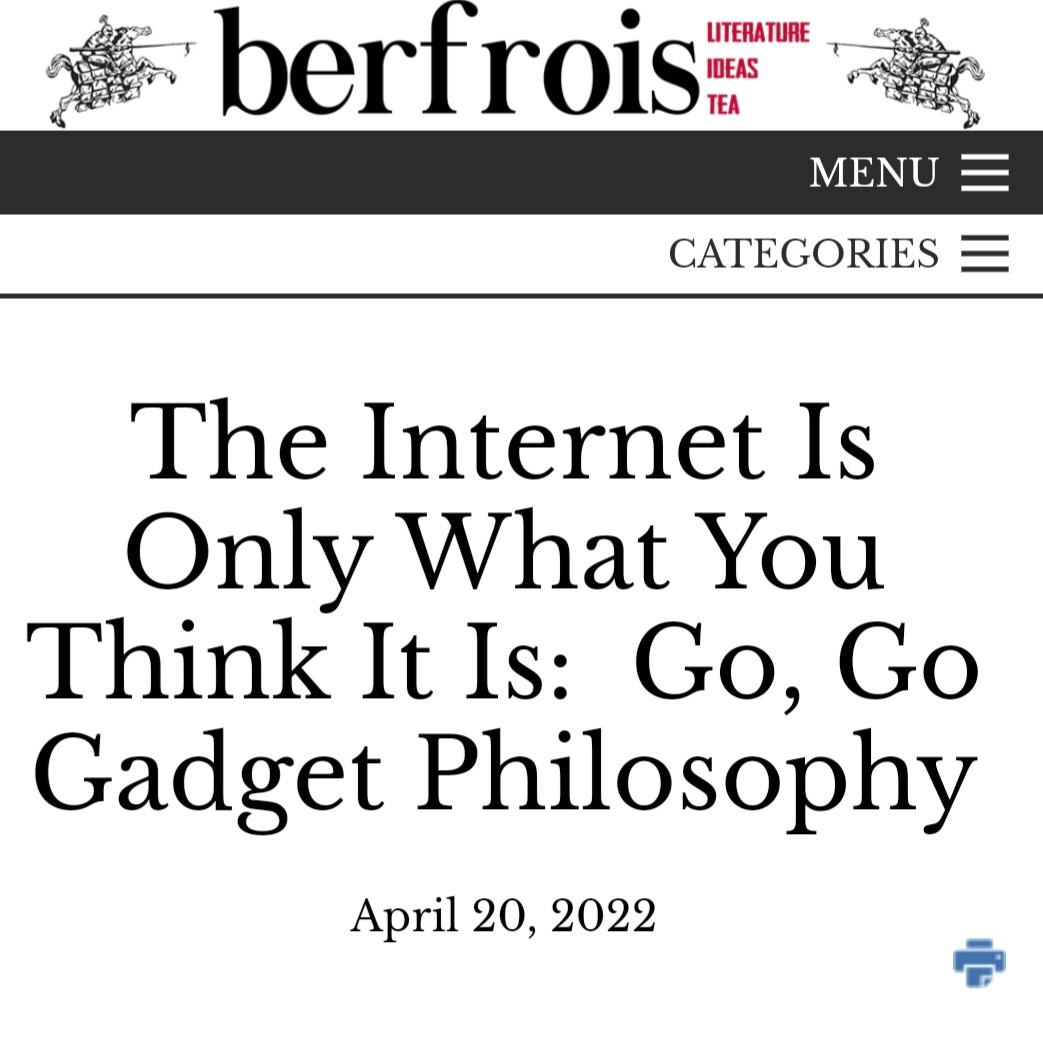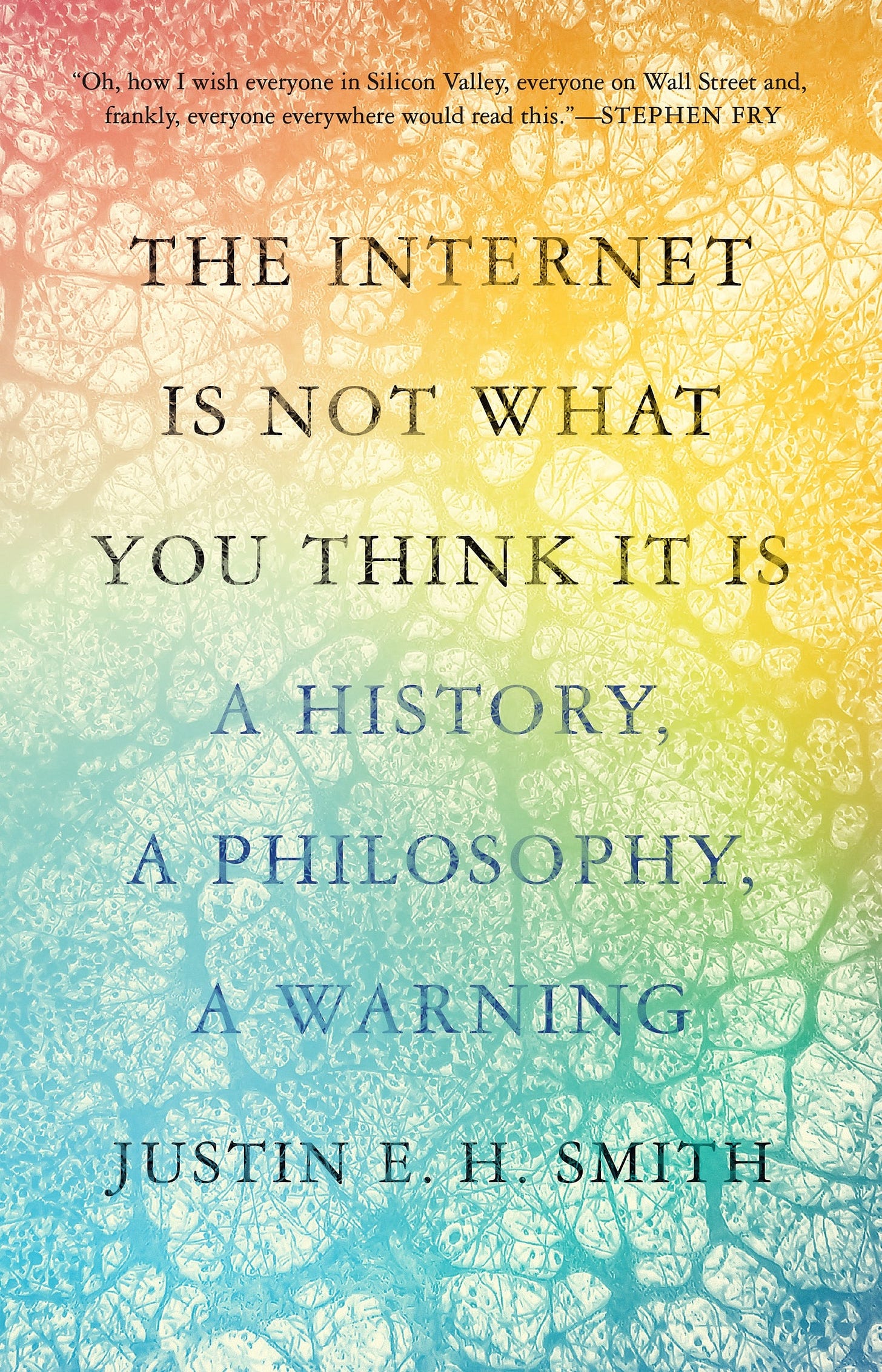Is it the internet?
‘Oh, how I wish…everyone everywhere would read this.’ Not my words, the words of Stephen Fry. An unusual thing to find on the front cover of an academic book published by Princeton University Press. Yet that’s what I found adorning the sleeve of Justin E.H. Smith's The Internet Is Not What You Think It Is: A History, A Philosophy, A Warning. It’s an unusual book too. It uses philosophical sources to try to rethink what we imagine the Internet to be, aiming to stretch our ideas beyond the internet as representing a short-term moment of unique and isolated change. It’s a book that seeks to disrupt what Smith refers to as the ‘anti-human’ aspects of the internet. Wide-ranging, provocative and unpredictable, it’s going to stir quite some debate over the coming weeks and months. It’s a very rich book.
When asked, I jumped at the chance to write about it for the magazine Berfrois (the piece is available to read for free here).
I was already thinking of reviewing the book anyway, it looked like it could be important and interesting. In the article I’ve tried to grapple with the big ideas in the text as much as I was able. It was not easy, Smith’s thinking takes some grappling with (as the ambitious book title suggests). There are lots of alleyways in the book’s chapters and lots of connections linking things together.
I ended up thinking about the vision that Smith produces from his unconventional genealogy. As I describe, the perspective produces questions about the relations between stability and novelty. I also ended up using it as an opportunity to reflect on how we can know, with personalisation and targeting, the vast and fragmented subjectivities of the internet.
Responding to Smith’s accounts, I end the piece by wondering if rather than the internet being something other than we think it is, instead the internet is only what we think of it (which may not stack-up as an argument, but I wanted to respond to the picture that Smith builds and the nodal methods that are used to cultivate broader impressions from individual experience). I explain that a little more in the piece.
When the review was commissioned I noticed that the audio book was available. That doesn’t often happen for books I’m generally working with or writing about. I thought I’d have a go at reviewing that rather than taking a pencil to the margins of a hardback (my usual approach). It was a more immaterial process, less tangible and a little disconcerting - the book passes by more quickly and so I wasn’t sure I was grasping it or that I was able to give it enough percolation time. I’ve not written a review of an audio book before. It is a little different to working from a text. I wondered if Ivmight miss something that would be more obvious in printed text, or, conversly, if I might actually know the text better than otherwise, given the interupted reading that normally takes place.
6 hours and 3 minutes of listening. It did take a different kind of concentration to stick with it - not because of the argument or quality of the book but because I’m used to listening to radio and podcasts in a slight state of distraction. Those familar types of audio consumption are more of a soothing background presence than the focal point for excerising the analytical imagination. I had to alter my listening practices to be able to review and respond to the detail. Quoting was also a bit tricky, it was more like transcription - I had to rewind a few times to try to get things right. Plus I then had a cross-check the online book for punctuation etc.
Another key difference is that it gave the book more of a storyteller tone. I’m not sure if the printed version would have left the same feeling. I was a bit worried that the audio might have skewed my impression of Smith’s style.
I think I’ll review from audio books again in the future, when the opportunity arises (not many books that will come my way are likely to be available in that format). I find that spending so much time on email and other reading and eye focused tasks can make it hard to read as many books as I'd like. The audio was a good way to use gaps between meetings, supervision and teaching. It was also a good for getting away from the visual, just writing notes as I listened. It’s a quite different way of working, it has more in common with writing music reviews in terms of technique. Perhaps it brings out a different aspect of the book format for a reviewer too.
On reflection, my approach here probably illustrates an argument Smith makes (that I didn’t include in the review) about the changing status of what a book is and how they fit into knowledge and practice. I never actually held the book under review in my hand. There are no pencil notes in the margins.
The piece I wrote for Berfrois can be found here.
Below is a link to a post by Justin E.H. Smith reflecting on his post-publication experience and more generally on what books are in this media landscape:





